Journey through the 15 nations mentioned in the Bible, unlocking their pivotal roles and intriguing mysteries within biblical narratives and prophecies.
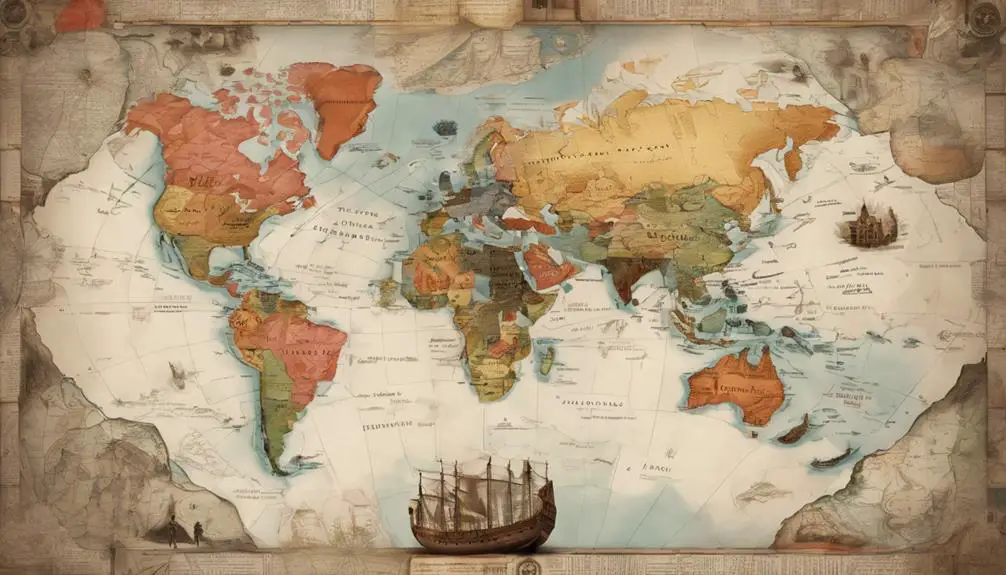
The 15 Nations in the Bible
While you might feel like an experienced world traveler, you've probably never journeyed through the fifteen nations mentioned in the Bible. These aren't just any countries, they're nations that have played a pivotal role in biblical narratives and prophecies.
From Egypt, the land of the Pharaohs, to Israel, God's chosen nation, each holds mysteries and stories that could keep a historian busy for a lifetime. But, why, you may ask, should you be interested in these ancient realms? Well, you'll find that exploring these nations offers fascinating insights into the world's oldest book.
So, are you ready for a trip back in time?
Key Takeaways
- The Bible features narratives deeply influenced by nations like Egypt, Babylon, Persia, Assyria, and Israel.
- These nations shaped biblical literature, religious interpretation, and historical context of the scriptures.
- Each nation's distinct cultural, religious, and political attributes significantly impacted biblical narratives and prophecies.
- These nations' interactions with Israel, God's chosen nation, are integral to understanding God's plan as depicted in the Bible.
Egypt: The Pharaoh's Land
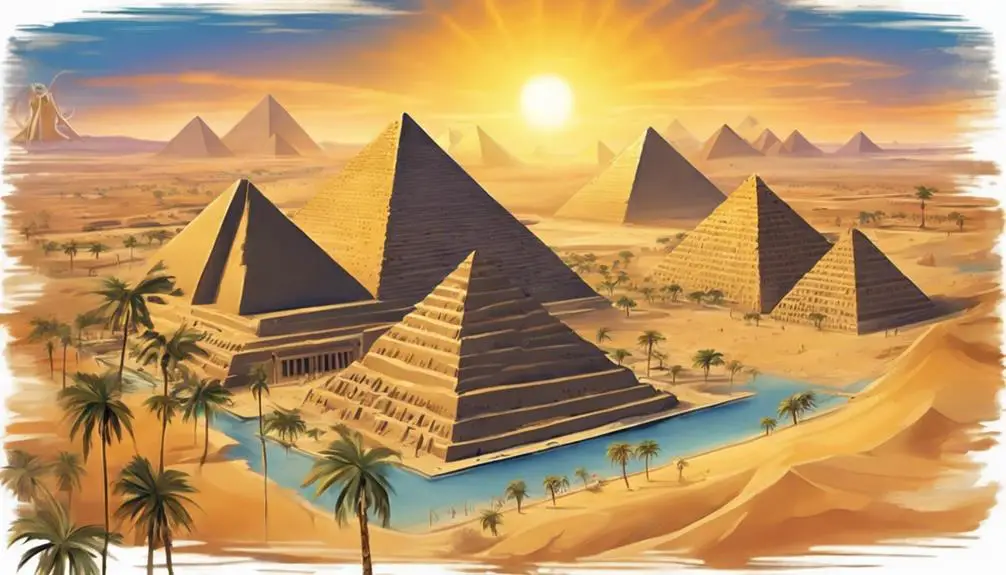
In Egypt, often referred to as the Pharaoh's Land, you'll find a deep-rooted biblical history, marked by complex interactions and significant events that have shaped religious narratives over centuries. The Pharaoh's power dynamics were central to this development. As the political and religious leader, the Pharaoh was viewed as a divine entity, bridging the gap between the mortal world and the realm of the gods.
This unique status influenced Egyptian religious practices. Worship wasn't confined to temples; it pervaded every aspect of daily life, reinforcing the Pharaoh's omnipotence. The Egyptian pantheon included a host of deities, each with distinct roles, yet all under the Pharaoh's authority.
Understanding these power dynamics is crucial. The Pharaoh's command was absolute; his word was law, his actions reflective of divine will. This contributed to an intense, sometimes volatile relationship between the Egyptian rulers and the Israelites, as documented in the Bible.
In analyzing Egypt's biblical history, one must consider these factors – the Pharaoh's authority, the population's deep-seated religious beliefs, and the interplay between the two. These elements not only shaped Egypt's narrative but also left indelible marks on biblical literature and religious interpretation.
Babylon: The Ancient Empire
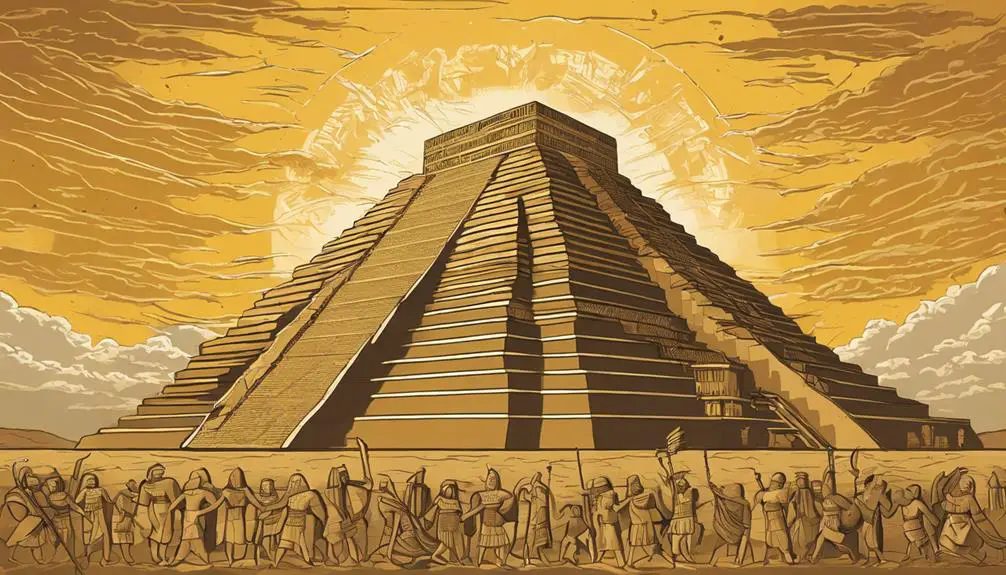
Shifting our focus towards the Ancient Empire of Babylon, you'll discover a civilization steeped in rich cultural history and religious traditions that played a pivotal role in the biblical narrative. Babylon's majestic architectural marvels, such as the Hanging Gardens, stand testament to their advanced engineering and artistic prowess.
The reign of King Nebuchadnezzar, in particular, left an indelible mark on the region, and features prominently in the Bible. Under his rule, Babylon witnessed unprecedented prosperity and expansion, transforming into an empire of great influence and power.
The table below provides a snapshot of Babylon's timeline, significant events, and biblical references.
Period |
Key Events |
Biblical References |
|---|---|---|
Early Babylon |
Rise of the city-state |
Genesis 10:10 |
Nebuchadnezzar's Reign |
Conquest of Jerusalem |
2 Kings 24:10-16 |
Late Babylon |
Fall to Persia |
Daniel 5:28 |
This analysis of Babylon's historical and biblical significance underscores its undeniable influence on ancient history and biblical narrative. You've now gained a deeper understanding of Babylon's pivotal role, including its architectural marvels and the impact of Nebuchadnezzar's reign.
Persia's Biblical Presence
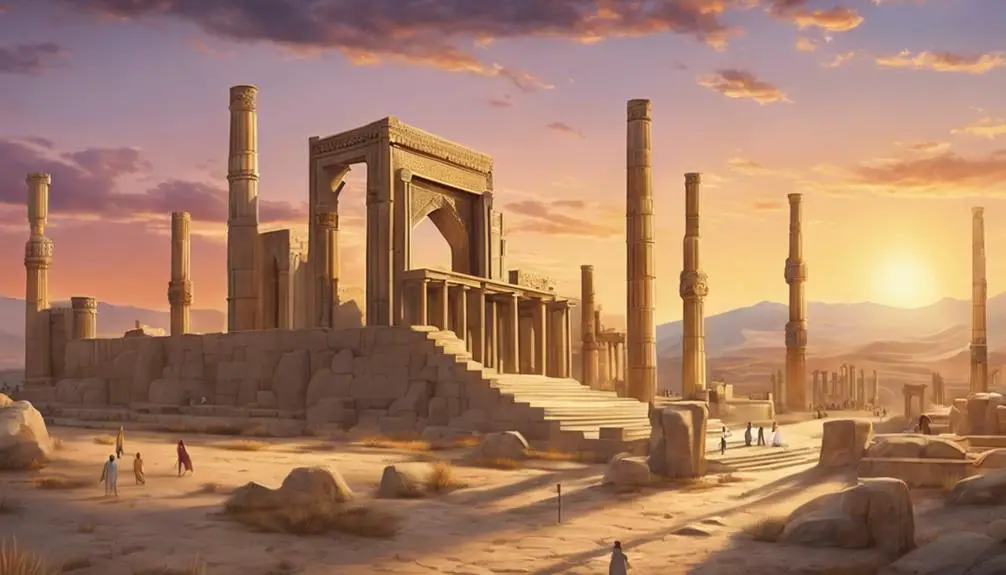
As you journey further into the biblical narrative, you'll encounter the substantial presence of Persia, a paramount power that emerged after Babylon's downfall. This ancient empire's influence is deeply ingrained in the Scriptures, particularly in relation to Judaism. The Persian influence on Judaism is evident in the way Persian kings facilitated the Jewish return to Jerusalem and the subsequent rebuilding of the Temple, pivotal events recorded in the books of Ezra and Nehemiah.
Delving deeper, you'll uncover the intriguing interface between Persian religious thought and the biblical world. The religion of Zoroastrianism, a monotheistic faith founded in ancient Persia, holds several biblical references. Scholars suggest that Zoroastrianism's concepts of angels, demons, and a final judgment may have influenced later Jewish thought. Furthermore, Daniel's visions in the Old Testament, filled with apocalyptic imagery, bear striking resemblances to Zoroastrian cosmology.
Thus, Persia's biblical presence isn't merely geographical or historical. It's a profound interweaving of religion, culture, and politics that left an indelible imprint on the biblical narrative. With Persia, you witness the Bible's intricate tapestry of nations and their respective influences, adding depth and complexity to your understanding of the Scriptures.
Assyria's Biblical Role
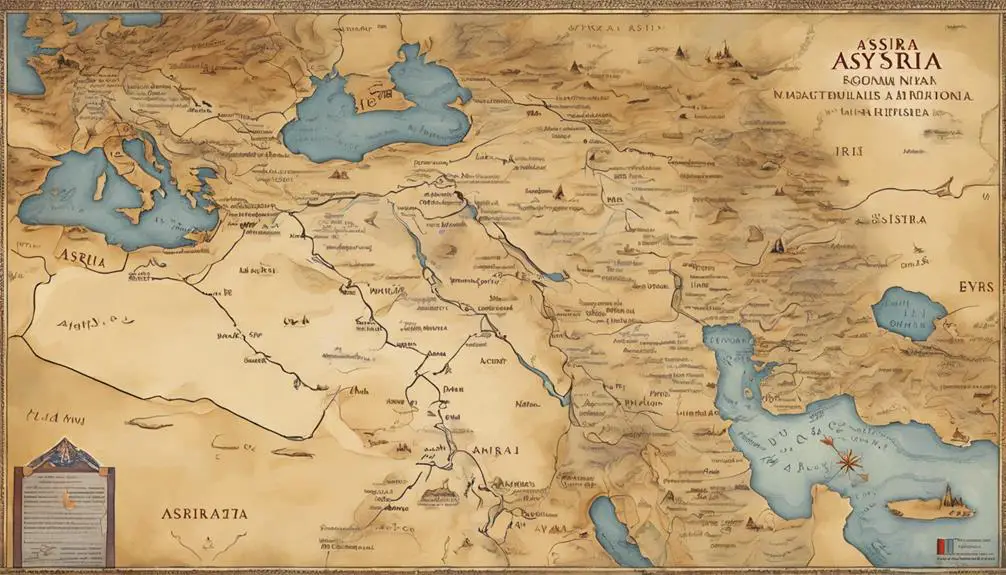
Turning your attention now to Assyria, another pivotal power in the biblical narrative, you'll find a nation whose role is as significant and complex as Persia's. Assyria's Conquests were a defining feature of their biblical presence, their aggressive expansionism shaping the geopolitical landscape of the ancient Near East. Assyria's military campaigns, notably against Israel and Judah, were instrumental in the eventual Israelite exile.
The Assyrian Religion, too, plays a crucial role in understanding Assyria's biblical image. Assyrian deities were numerous and diverse, reflecting a cosmology fundamentally at odds with the monotheistic worldview of the Israelites. The Bible often portrays the Assyrian deities as false gods, symbolizing the ideological clash between monotheism and polytheism.
In essence, Assyria's role in the Bible is one of antagonism and conquest, their aggressive campaigns and religious practices serving as a foil to Israelite identity. Yet, it's important not to oversimplify Assyria's biblical role. Assyria, like all nations in the Bible, carries layers of meaning and significance, shaped by historical, cultural, and theological factors. Their story is a testament to the complex interplay of power, faith, and identity in the biblical narrative.
Israel: God's Chosen Nation
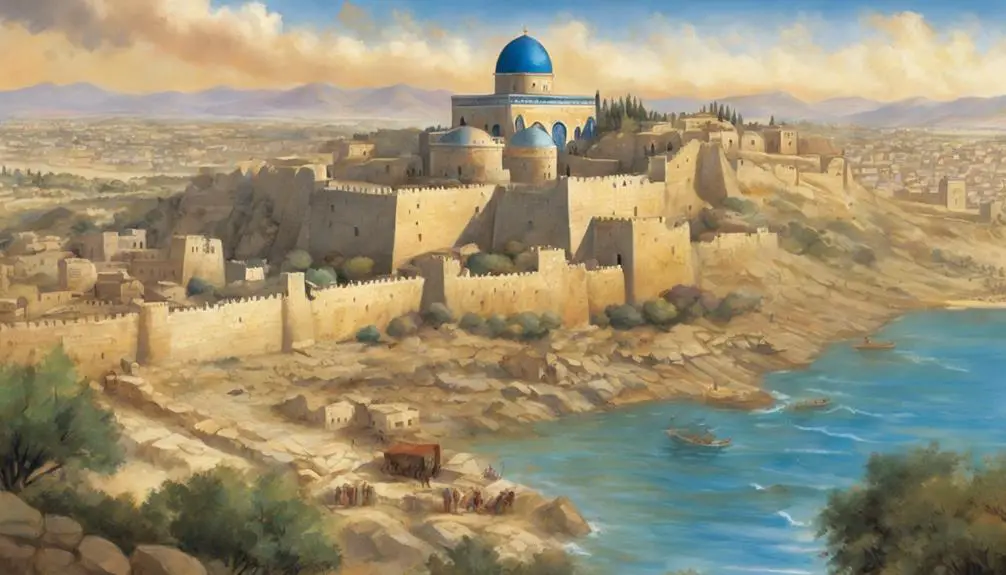
In the tapestry of biblical narrative, Israel emerges as God's chosen nation, a beacon of divine favor and the focal point of many pivotal events. This isn't accidental but rather part of Israel's Divine Appointment, a preordained destiny set by the Almighty Himself. You'll notice that the Bible repeatedly underscores Israel's role as the chosen nation, a testament to their unique relationship with God.
Delving deeper, you'll find the Prophetic Significance of Israel is equally noteworthy. The nation's journey, its trials, and triumphs, offer prophetic foreshadowing of events that resonate far beyond their time. The stories of its patriarchs, matriarchs, and kings often serve as allegories, prophetic parables that transcend the immediate context to illustrate broader spiritual truths.
Israel's role isn't limited to the past, either. Biblical prophecy underscores Israel's future relevance too. The nation is often seen as the epicenter of eschatological events, the final chapters in God's divine plan.
In essence, Israel's role as God's chosen nation isn't just a historical fact, but a continuing narrative woven deeply into the fabric of biblical prophecy and theology. It's an integral part of understanding the Bible's message and God's overarching plan for humanity.
The Kingdom of Judah
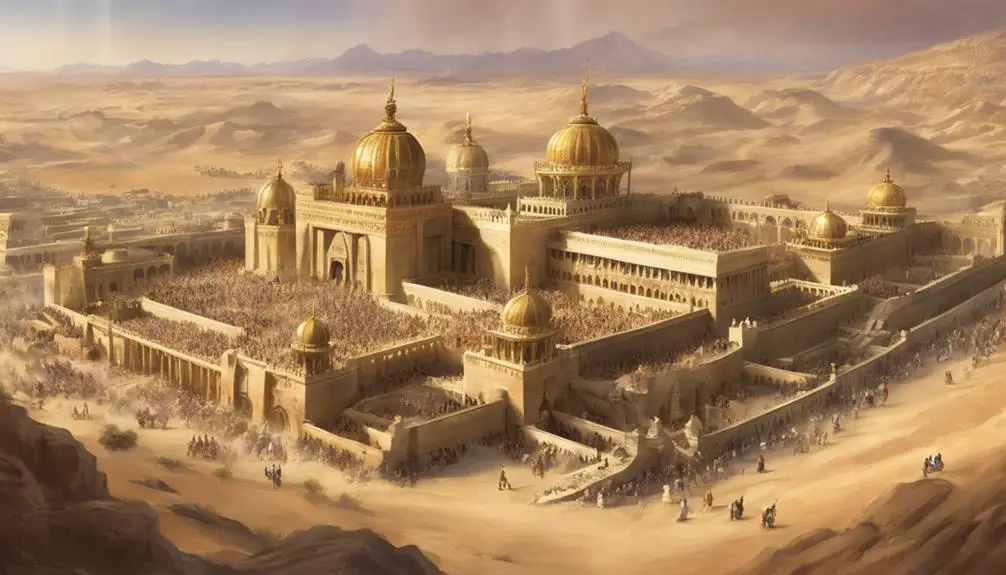
While examining the role of Israel in biblical narratives, you can't ignore the significant part played by the Kingdom of Judah, a prominent entity that was both politically and theologically significant. Judah's Monarchy Structure was unique, with a monarchic system that was hereditary and centralized, differing substantially from Israel's more tribal-based leadership.
Now let's delve deeper into this structure. The monarchy was headed by a king, who held both religious and political authority. The king's duties included maintaining justice, ensuring religious observance, and leading the military.
Monarchy Structure |
Role |
|---|---|
King |
Supreme leader, religious and political head |
Prophets |
Spiritual advisors, social critics |
You can't discuss Judah without mentioning the Prophets in Judah. These were spiritual leaders who often served as social critics, challenging the king and people when they strayed from God's laws. They were instrumental in shaping Judah's religious landscape.
Moab: A Lesser-Known Realm
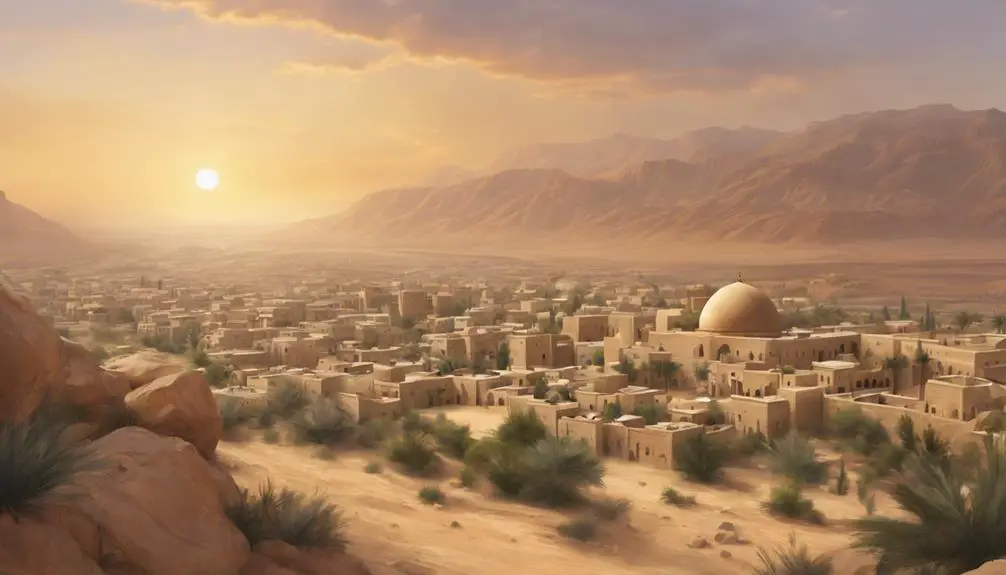
Dusted with the sands of time and nestled within biblical narratives, the realm of Moab provides a fascinating glimpse into a lesser-known, yet significant, nation of antiquity. Located east of the Dead Sea, Moab's unique culture and religious practices were often at odds with those of its Israelite neighbors.
Moab's culture was marked by three primary aspects:
- Ingenuity in Agriculture: Moabites, despite the arid lands they inhabited, developed advanced farming techniques, making them a prosperous nation.
- Architectural Prowess: Their impressive fortifications and structures, as attested in various archaeological findings, reflect a sophisticated society.
- Religious Syncretism: The Moabite deities influence was considerable, with a pantheon that included Chemosh, their national god, as well as other deities borrowed from surrounding nations.
This hybridization of deities helped foster a unique culture that held its own amidst powerful neighboring nations. However, it also led to significant tension with the Israelites, who adhered to strict monotheism.
As you delve deeper into the realm of Moab, you'll discover a nation that, while lesser-known, played a significant role in shaping the biblical narratives and the history of the Ancient Near East.
Edom in Biblical Times

Shifting our focus southward, you'll encounter Edom, an ancient kingdom whose complex relationship with Israel is intricately woven into the tapestry of biblical history. This nation, located south of the Dead Sea, was famed for its red sandstone mountains, hence its name, Edom, meaning 'red.'
Trade in Edom was a significant aspect of its existence. Its strategic location along the King's Highway, an ancient trade route, was a lucrative advantage. Edom traded extensively with its neighbors, dealing in spices, gold, precious stones, and textiles.
However, Edom's demise was as dramatic as its rise. Despite its alliances and trade, Edom fell under the control of the Babylonians and later, the Nabateans. Its downfall was prophesied in the Bible, particularly in the book of Obadiah, where it's written, 'Though you soar like the eagle and make your nest among the stars, from there I'll bring you down,' declares the Lord.
Edom's legacy, though marred by conflict with Israel and eventual downfall, remains an important part of biblical history. Its remnants serve as a testament to a once thriving and influential kingdom, forever enshrined within the biblical narrative.
Philistia and the Philistines
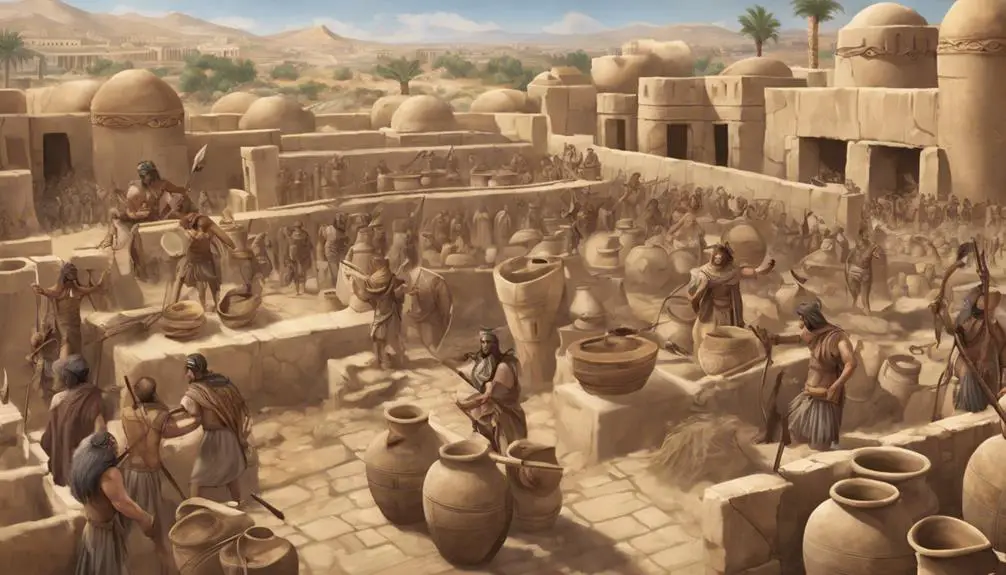
Turning our attention to the west of ancient Israel, you'll find Philistia, a region inhabited by the Philistines, a sea-faring people whose interactions with the Israelites significantly shaped the biblical narrative. The Philistines, historically a somewhat mysterious group, have recently been illuminated through the Philistine Artifacts Discovery, shedding light on their unique societal and religious practices.
Let's focus on the following three key aspects:
- Philistine Artifacts Discovery: Recent archaeological excavations have uncovered a wealth of Philistine artifacts, including pottery, jewelry, and weapons. These discoveries offer valuable insights into the Philistine's day-to-day existence, their trade relationships, and their aesthetic sensibilities.
- Philistine Religion Practices: Evidence from these artifacts has also provided a rare glimpse into the Philistine's religious practices. It appears they worshipped a pantheon of gods, with a predominance of fertility deities. Their sacred sites often featured altars and offerings, indicative of ritualistic practices.
- Interactions with Israelites: The Philistines' interactions with the Israelites were often contentious, leading to several notable conflicts detailed in the Bible. These clashes significantly influenced the historical and theological trajectory of the Israelites.
Thus, the Philistines, through their archaeological imprint and biblical accounts, provide an intriguing window into the complexities of ancient Near East societies.
The Hittite Empire
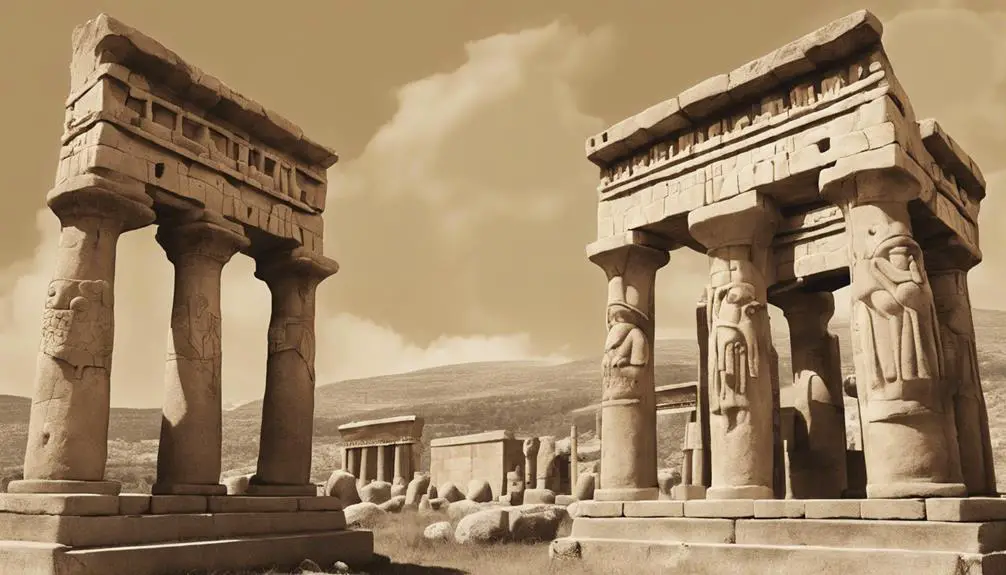
As we journey further into the intriguing tapestry of ancient Near East societies, let's cast our gaze upon the Hittite Empire, a formidable power whose influence was extensive and profound. Located in what's now Turkey, the Hittites emerged around 1600 BCE and were a dominant force until their decline around 1200 BCE.
Diving into Hittite architecture, you'll find it was a testament to their ingenuity and resourcefulness. They made use of available materials, constructing grand structures with intricate stonework. They built imposing fortified cities, temples, and palaces, exhibiting a deep understanding of both aesthetics and utility.
Equally impressive were Hittite warfare tactics. Skilled in chariot warfare, they effectively combined infantry, archers and charioteers to overpower their foes. Notably, the Hittites were among the first to master ironworking, giving them a significant edge in combat.
In analyzing the Hittites, let's not overlook their legal system. They had one of the most comprehensive legal codes of the ancient world, covering a vast array of social and economic issues. This sophistication in governance further highlights the Hittites' advanced societal structures.
The Hittite Empire's legacy in the Bible and history is a testament to their significant cultural and military influence. Their impact continues to resonate in our understanding of the ancient Near East.
The Ammonite Kingdom
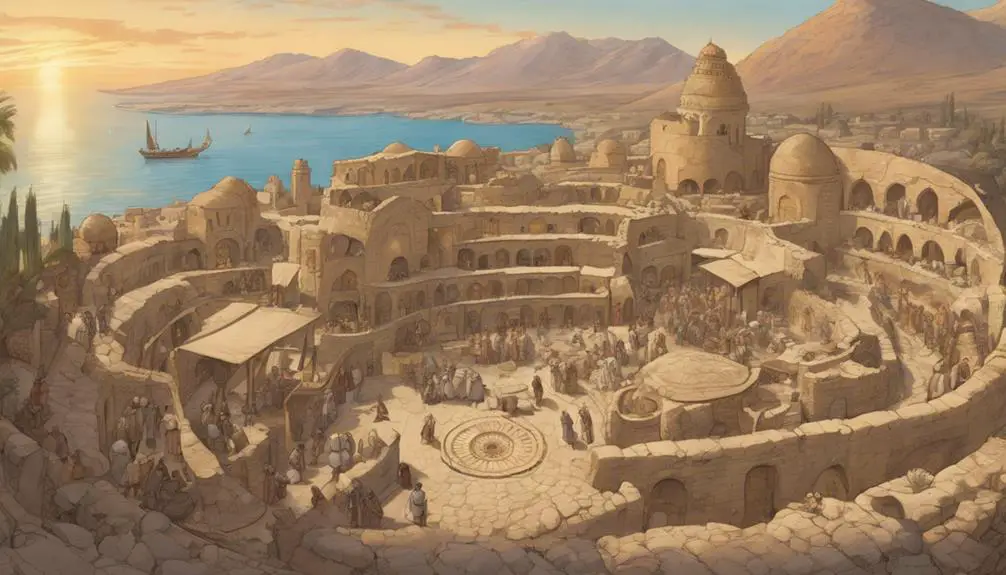
Now, let's delve into the realm of the Ammonite Kingdom, a significant yet often overlooked entity that thrived in the eastern region of the Jordan River, from the 13th century BCE to the 2nd century BCE. This kingdom, with its unique cultural and societal manifestations, offers considerable insights into the biblical era.
- Ammonite Religion: The Ammonites were polytheistic, worshipping several deities, but their chief god was Milcom or Molech. This deity was often associated with child sacrifice, a practice that was heavily criticized in the Old Testament.
- Ammonite Architecture: The Ammonite Kingdom's architecture was quite distinctive. They were known for their fortress-like cities, such as Rabbath-Ammon, their capital. Their structures often incorporated elements of other regional styles, reflecting the Ammonites' adaptive nature.
- Political Interactions: The Ammonites frequently interacted with their neighbors, including the Israelites, Moabites, and Assyrians. These interactions often resulted in conflicts, alliances, and cultural exchange.
These three aspects of the Ammonite Kingdom—religion, architecture, and political interactions—provide a comprehensive view of their society, culture, and influence. As you continue to explore biblical nations, keep in mind these unique characteristics that make the Ammonites stand apart.
Exploring Canaan's History
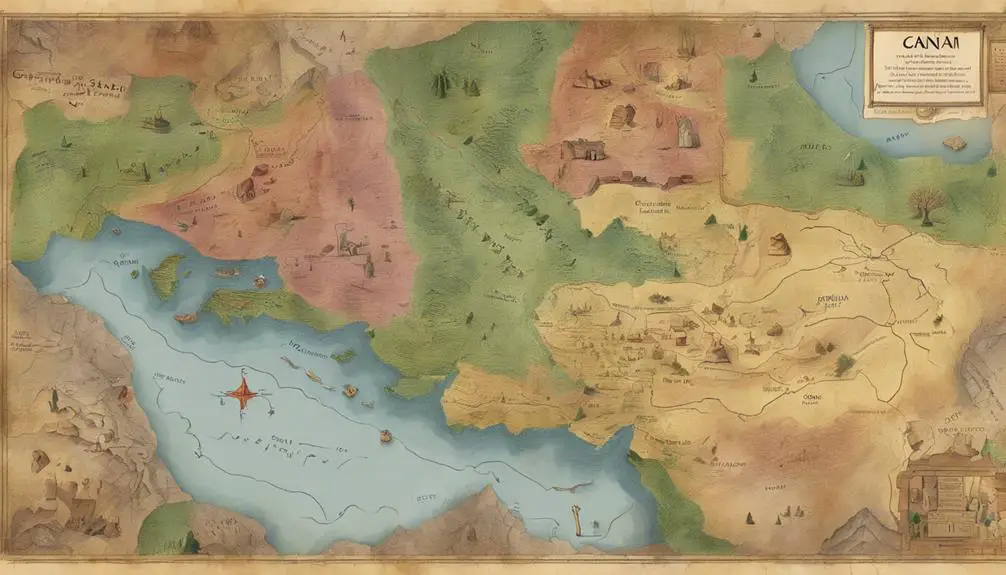
Shifting our focus from the Ammonite Kingdom, you'll find that the history of Canaan, another pivotal region in the biblical narrative, is an equally intriguing area of study. Notably, the Canaanite religion influences permeate various biblical stories, and Canaan's archaeological findings offer additional insight into this ancient civilization's way of life.
To give a clearer picture of Canaan's historical significance, let's delve into some key aspects:
Aspect |
Description |
Relevance |
|---|---|---|
Canaanite Religion |
Canaanite deities and religious practices had a profound impact on the biblical narrative, shaping Israelite beliefs and rituals. |
It provides context to understand the Israelites' struggle to maintain their distinctive religious identity. |
Archaeological Findings |
Discoveries like pottery, inscriptions, and temples provide tangible evidence of Canaan's culture and lifestyle. |
It corroborates biblical references and enriches our understanding of Canaan's societal structure. |
Biblical References |
Canaan frequently appears in the Bible, often as a land promised to the Israelites. |
It highlights Canaan's strategic and symbolic importance in the Bible. |
When you examine these aspects, you'll appreciate how Canaan's history intertwines with biblical narratives, enriching our understanding of this ancient civilization and its timeless influence.
The Aramean Kingdom
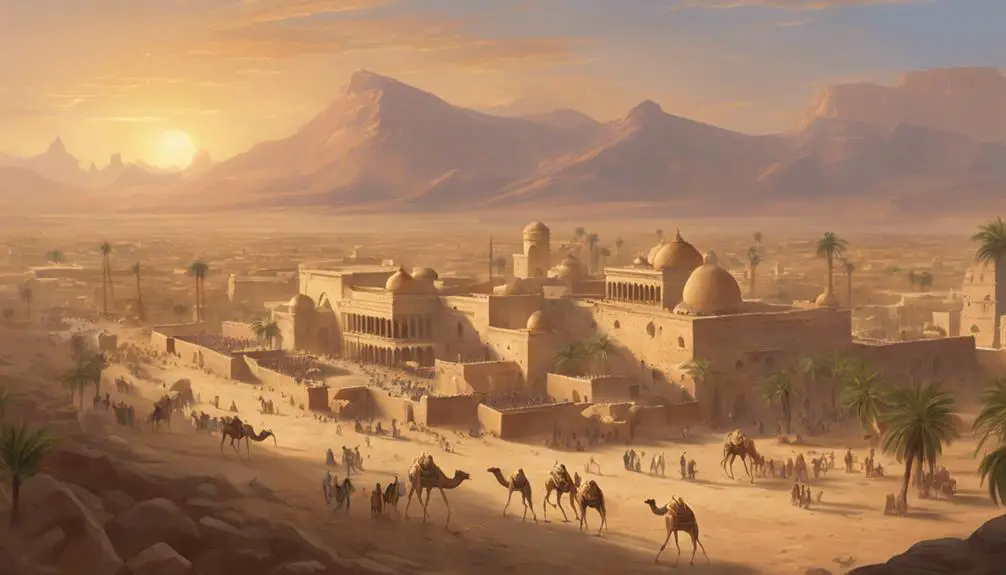
Diving into the realm of the Aramean Kingdom, you'll uncover a civilization that left an indelible mark on the biblical landscape through its unique culture, strategic location, and complex political dynamics. The Arameans, often overlooked, played a vital role in the ancient Near East.
The Aramean culture significance is evident in three key areas:
- Cultural Influence: The Arameans' unique customs and traditions found their way into the wider Near East culture, shaping it significantly.
- Geopolitical Role: Occupying a strategic position between the mighty Assyrian and Babylonian kingdoms, the Arameans often influenced political events and alliances.
- Linguistic Impact: The Aramean language influence permeated far and wide, becoming the lingua franca of the Near East and even influencing the Hebrew language.
The Arameans' influence wasn't only confined to their immediate region but expanded throughout the Near East, shaping cultures, politics, and languages. Their enduring legacy, though often underrepresented, is a testament to their historical importance. The Aramean Kingdom stands as a significant example of how a seemingly small nation can leave a profound mark on the course of history.
Midian: A Desert Nation
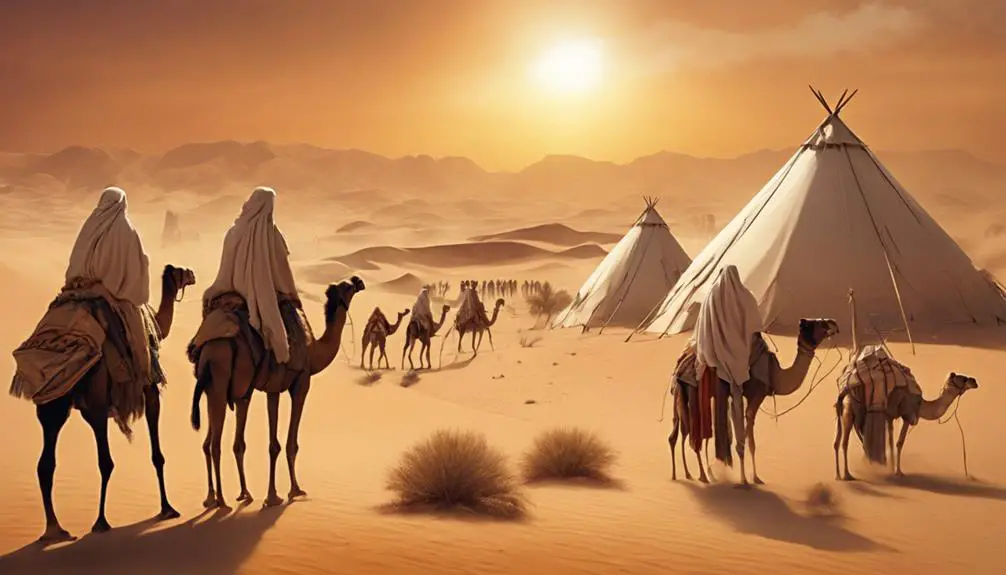
Emerging from the arid expanses of the desert, Midian, another nation prominently mentioned in the Bible, offers a compelling study of a people shaped by their harsh environment and complex socio-political relationships. Midian's influence, extended through their survival and adaptation in the unforgiving desert environment, underscores their resilience and resourcefulness.
As you delve into the historical and biblical records, you're introduced to a society that developed unique strategies for desert survival. They harnessed the scarce resources of the desert, transforming them into tools for growth and survival. Their nomadic lifestyle, necessitated by the desert's scarcity, also shaped their social structure and economy. Trade, particularly the trading of precious commodities like spices, gold, and incense, became a cornerstone of their society, further amplifying Midian's influence.
Their geographical position and trading prowess also drew them into intricate socio-political relationships with neighboring nations. The Bible's accounts of Midian's interactions with Israel, for instance, highlight the complex interplay of cooperation, conflict, and competition that characterized their interactions.
The Land of Amalek
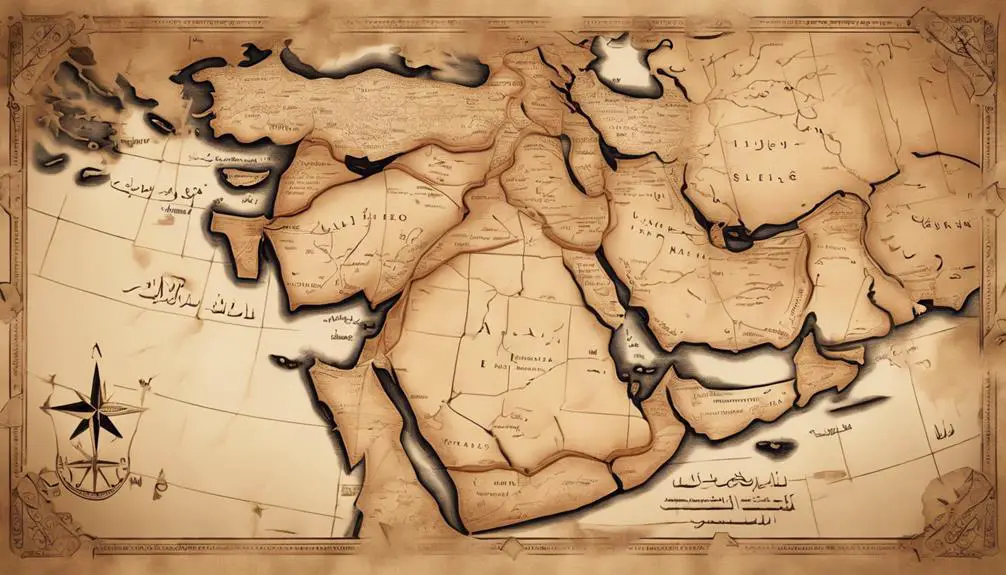
Moving from the arid expanses of Midian, let's now explore the biblical accounts of the Land of Amalek, a nation often depicted in a state of constant conflict and strife. The Amalekites, inhabitants of this land, were fierce and unyielding, their warriors known for their ruthlessness.
- Geographical Location: The Land of Amalek, according to biblical accounts, was located in the Negev region, extending towards the Sinai Peninsula. This desert land, harsh and inhospitable, shaped the Amalekite warriors into formidable opponents.
- Historical Conflicts: The Amalekites were involved in various conflicts, most notably with the Israelites. Their initial encounter, shortly after the Exodus, set the stage for a long-standing enmity.
- Amalek's Downfall: It was prophesied in the Bible that the memory of Amalek would be blotted out. This prophecy was fulfilled during the reign of King Saul and finalized by the Purim events, leading to the extinction of the Amalekites.
The Land of Amalek, its history, and its people, provide intriguing insights into the dynamics of power, survival, and downfall in the ancient biblical world. Understanding this helps to deepen our comprehension of the context and messages within the Bible's rich tapestry of narratives.
Frequently Asked Questions
What Are the Common Cultural Similarities and Differences Among These 15 Nations Mentioned in the Bible?
You'll find that common cultural similarities among these nations often revolve around Biblical Nation Languages and faith-based traditions.
On the other hand, differences arise in Religious Practices Comparison, as each nation interpreted and applied religious texts in unique ways. This diversity shaped their customs, laws, and societal norms.
It's this complex interplay of similarities and differences that creates the rich tapestry of heritage and belief systems in these nations.
How Did These Nations Interact With Each Other During Biblical Times?
You'd find that during those times, interactions were largely influenced by Biblical nation alliances, which often resulted in shared cultural and religious practices.
Some nations adopted others' religious customs, leading to a blend of practices. However, conflicts weren't uncommon due to differences in beliefs.
Trade also played a key role in their interactions, fostering both cooperation and competition. It's fascinating to delve into the complexities of these ancient interactions.
Are These Nations Still in Existence Today, and if So, What Are Their Modern Counterparts?
You're asking if ancient nations, noted for their biblical economies and religious practices, still exist today. Many do, but they've evolved. For example, Egypt and Israel are modern counterparts of their biblical selves. Others, like Moab and Ammon, have faded into history.
It's fascinating to trace these transformations, giving us insights into how ancient civilizations have shaped our world. Remember, however, that geopolitical boundaries have changed significantly since biblical times.
What Roles Did Women Play in These Ancient Biblical Nations?
Women's roles in ancient societies were multifaceted. Spirituality was a key aspect, with women often serving as priestesses, prophetesses, or in other religious roles.
They also engaged in gendered leadership, sometimes ruling as queens or influential figures. However, their status and roles varied greatly, depending on cultural norms, socio-political contexts, and religious beliefs.
These multifarious roles of women in ancient societies demonstrate the complexity of their experiences and contributions.
What Are Some Major Archaeological Findings Related to These Nations That Have Helped Us Understand Their Biblical History Better?
You've likely heard about the Biblical Artifacts Discovery. Major findings, like the Dead Sea Scrolls or the Rosetta Stone, have significantly improved our understanding of biblical history.
Through Ancient Architecture Analysis, we've deciphered societal structures and religious practices. These discoveries shed light on the socio-political dynamics and cultural norms of those times, providing a more nuanced understanding of the scriptures.
Conclusion
In studying these 15 nations, you've journeyed through the Bible's historical landscape, encountering places like Egypt, Babylon, Persia, and Israel. You've seen the pivotal roles they played, whether as oppressors, liberators, or God's chosen people.
Your exploration of these ancient societies – from the desert nation of Midian to the land of Amalek – provides a richer understanding of biblical narratives and their cultural contexts. This deep dive into history truly breathes life into the Bible's pages.



Sign up